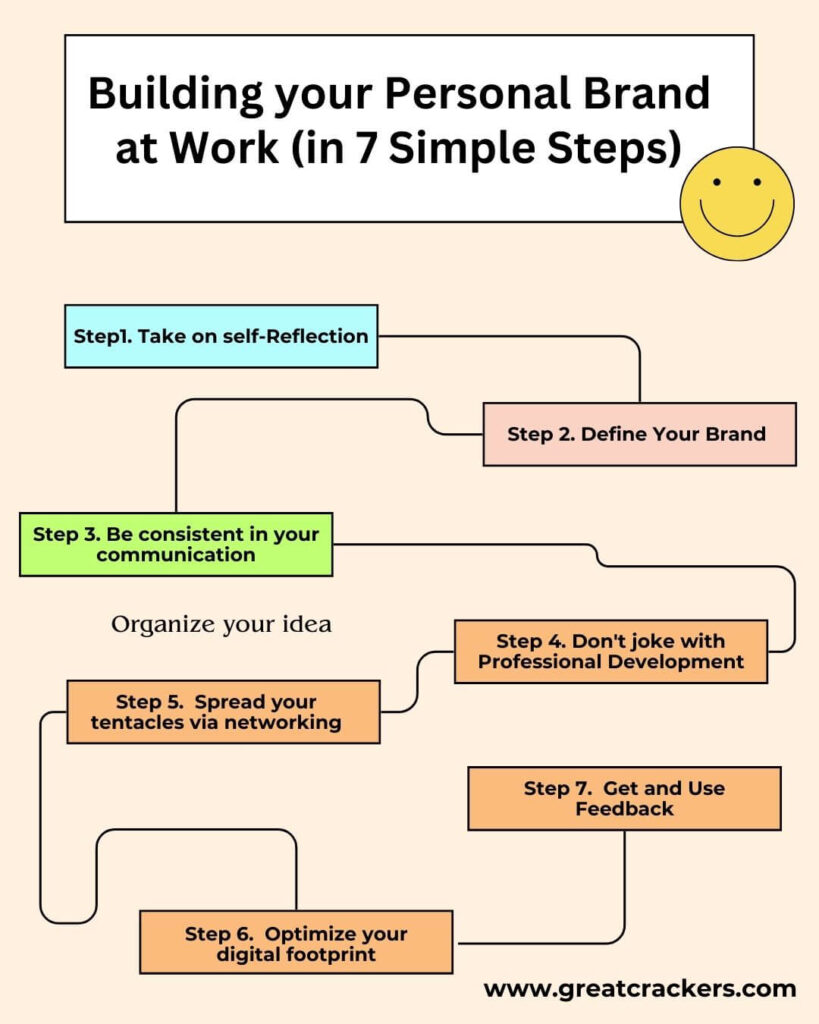Building your Personal Brand at Work (in 7 Simple Steps)
Building your personal brand at work as a rookie can be somewhat challenging. However, this guide will walk you through creating your brand in your workplace, breaking down everything you need to know.
That said, here is what we’ll consider in this article:
- What Is Personal Branding?
- What does it mean to build your brand at work?
- Why Would You Want a Personal Brand?
- Challenges of Building your Personal Brand at Work as a newbie
- 7 Steps to Build Your Personal Brand at Work
- Ways Companies Can Support Their Employees Personal Brands
What Is Personal Branding?
Personal branding is the deliberate process of establishing and promoting your distinct identity, values, and expertise. It involves you creating a unique online and offline persona to set yourself apart in both personal and professional realms.
Strategically communicating your message and consistently using visual elements empowers you to shape perceptions, enhance credibility, and create new opportunities.
You create a lasting impression aligned with your goals and aspirations by crafting a personal narrative that resonates with your audience. And essentially, that helps you shape your professional image.
What does it mean to build your brand at work?
Building your professional brand at your work means carefully creating and promoting a unique identity. This involves blending your skills, achievements, and values with your organization’s goal.
You set yourself apart when you showcase your skills, communicate well, and create positive relationships. And that helps you build a strong professional reputation for lasting impact at your workplace.
For example, imagine you consistently deliver high-quality work, communicate clearly in team meetings, and actively collaborate with colleagues.
More often than not, such intentional efforts help you demonstrate competence and foster positive relationships. That could lead to increased recognition within your organization.
Also, this visibility may open up new opportunities, such as being considered for leadership roles or essential projects. In the end, this enhances your career prospects.
Why Would You Want a Personal Brand?
Developing a personal brand is crucial for career growth and influence. It aligns your professional identity with aspirations and sets you apart in a competitive landscape.
Moreover, it builds authenticity and helps you attract opportunities and connections. For instance, imagine you always show your expertise and values in your field.
Of course, such deliberate effort can lead to increased recognition and perhaps allow you to secure leadership roles or collaborations. Hence, showcasing a strong personal brand can contribute to career growth.
However, in the end, a robust personal brand serves as a strategic asset. That’s because it offers a unique narrative that resonates and paves the way for meaningful collaborations and career advancement.
Challenges of Building your Personal Brand at Work as a newbie
Building a personal brand at work can be challenging for newbies. Here are some of the challenges they may face:
1. Lack of clarity
If you’re trying to build a personal brand for the first time, chances are that you’re struggling. You may be finding it hard to define your brand, including your uniqueness, values, and contributions.
2. Fear of vulnerability
Building a personal brand requires being authentic and vulnerable. Unfortunately, that can be intimidating for newbies.
3. Limited experience
If this is your first time trying to create a personal brand work, most likely you have limited experience to draw from when building your brand.
4. Lack of support
As an employee trying to build a brand at work, you may not receive support from your managers or colleagues. Often, this can complicate the entire process, making the next challenge more difficult to overcome.
5. Feeling overwhelmed
Building a personal brand can be time-consuming and overwhelming, especially for newbies still learning the ropes. That’s why you should read carefully the seven steps outlined and explained below.
7 Steps to Build Your Personal Brand at Work
At work, you can build your brand strategically by defining your unique value and aligning it with organizational goals. Then, actively promote it across various channels.
While that sounds simple and easy, here are some steps to help you build your personal brand at work:

#1. Take on self-Reflection
Creating a personal brand in the workplace often begins by understanding your strengths, values, and career goals. That involves reflecting on what makes you unique and how you want people to perceive you in your workplace.
For instance, if you’re good at problem-solving and collaboration, you can actively showcase these skills in your team projects. Doing this will highlight your unique contributions and strengthen a positive perception among your colleagues.
#2. Define Your Brand
Once you’ve reflected on yourself and identified what makes you unique, it’s time to define your brand. Clearly state your skills, expertise, and the value you offer. To do that, you should create a brief personal brand statement that conveys your essence and what distinguishes you.
For example, if you excel in project management and innovation, your personal brand statement could be: “I am a dynamic project manager known for driving innovation and delivering results that exceed expectations.”
Certainly, such a clear expression states your strengths and establishes a positive professional tone for you. But more importantly, it emphasizes your key attributes and how you want to be perceived.
#3. Be consistent in your communication
In the digital world, consistency reinforces your brand across various channels. That’s why, in developing a personal brand at work, you must maintain consistency on all platforms with your messaging.
Ensure your online profiles, presentations, and interactions reflect your established brand by aligning spoken and written communication consistently across platforms.
If your brand highlights creativity, ensure your online profiles feature creative projects, even as your presentations showcase innovative solutions.
Let’s say you’re a creative graphic designer. You want to ensure your online portfolio showcases diverse and visually striking projects. Also, in client presentations, showcasing how your innovative designs boosted previous marketing campaigns is something you should include.
#4. Don’t joke with Professional Development
Take it or leave it. The success of the brand you’re building depends on how you consistently improve your skills and knowledge. Of course, you can attend workshops, pursue certifications, and stay current on industry trends to strengthen your expertise.
For example, if you’re in digital marketing, attending workshops on the latest tools and strategies is vital. That’s because this will enhance your professional capabilities as you obtain knowledge and certifications in emerging trends in your field.
#5. Spread your tentacles via networking
Cultivate connections inside and outside your organization. Attend industry events, participate on professional platforms, and seek mentorship for network expansion.
For instance, joining industry-related forums or networking events can connect you with professionals who may offer valuable insights and opportunities for collaboration.
#6. Optimize your digital footprint
In this age, you cannot overemphasize the need to be online as a business, brand, or professional. But that isn’t enough. Optimizing your online presence is crucial.
Take your LinkedIn profile, for example, you’re to optimize it by keeping it professional and current. You can share insightful content and highlight achievements for increased visibility.
To do that, you regularly post industry-related articles or achievements on LinkedIn. Doing this can help demonstrate your expertise and attract attention from potential employers or collaborators.
#7. Get and Use Feedback
Every person, brand, or business organization needs genuine feedback from people to grow and thrive in an ever-competitive world. That makes it okay to often seek feedback from your colleagues, mentors, and supervisors while building your brand at work.
That way, you use their constructive input to adjust your brand and align it with your evolving career goals.
For example, if the feedback you got highlights a need for stronger leadership skills, that calls for actively working on developing those skills. Only then can you showcase them in your professional interactions.
Ways Companies Can Support Their Employees Personal Brands
Many people wonder whether a company should encourage its employees to build their personal brand at work. Haiilo clarified why businesses should back employees’ personal branding by outlining three key reasons to address that unsettling question. They include:
- Better exposure for your company
- Positive word of mouth for your business
- Positive word of mouth for your organization
That said, here are seven ways a company can stimulate its workers to create their brands at work:
-
Encourage Skill Development
Companies can support personal brands by offering skill development opportunities. For instance, providing access to online courses or workshops helps employees enhance their expertise. It might involve learning new software, improving leadership skills, or other activities.
-
Promote Employee Recognition Programs
Another way a company can encourage employees to build their brands at work is through recognition programs. When you publicly recognize and celebrate employees’ achievements, like meeting sales targets or leading a project successfully, it motivates them to excel further.
-
Flexible Work Environment
Supporting work-life balance enhances personal brands. Offering flexible schedules or remote work options shows that the company values and respects employees’ individual lifestyles.
-
Provide Mentorship Opportunities
Companies help employees grow their networks and gain insights when they implement mentorship programs. That fosters professional development and strengthens personal brands because they connects junior employees with experienced mentors.
-
Amplify Employee Voices
A company can actively share its employees’ achievements on social media or its website. For example, spotlighting an employee’s community service boosts their brands and underscores the company’s dedication to social responsibility.
-
Provide Branding Resources
Businesses can encourage employees to build their personal brands by providing resources and guidelines for consistent personal branding on social media platforms.
Offering tips on crafting professional profiles and sharing relevant content aids employees in presenting a polished online image well.
BONUS: Let them work on different projects with different teams
It’s good to try different things and work with different people. So, a company can encourage its employees to join projects with colleagues from other departments. This way, they can show what they’re good at and learn from others.
Examples of Personal Brand at Work
As said, personal branding at work involves effective communication, leadership, adaptability, problem-solving, and strategic networking. These qualities, when genuinely demonstrated in practical situations, contribute to a robust professional identity and enhance career growth and opportunities.
Thus, here are examples of a personal brand in the workplace, taking these qualities into account:
Example 1: Effective Communication
In a corporate boardroom, effective communication is key. Imagine a situation where a team leader explains complex ideas clearly and listens actively to team members. This keeps information flowing smoothly and makes the person a trusted and influential communicator in the organization.
Example 2. Leadership Excellence
Leadership is a defining element of a personal brand. Imagine a project manager who consistently guides their team with vision and motivation.
By taking accountability for both successes and setbacks, this leader earns the respect of their peers and subordinates. In doing so, they solidify their personal brand as a reliable and inspiring figure in the workplace.
Example 3. Adaptability and Innovation
In a rapidly changing market, adaptability is paramount. Imagine an employee who embraces change and actively seeks out new challenges.
Creating an innovative environment makes this person known for being adaptable, resilient, and proactive. It solidifies their personal brand as someone who excels in dynamic work settings.
Example 4. Problem-solving Prowess
Consider an employee who consistently contributes innovative solutions to workplace challenges. Whether it’s streamlining processes or overcoming obstacles, this problem-solving prowess enhances operational efficiency.
It also positions the individual as a valuable asset. Their personal brand becomes synonymous with effective and creative problem-solving.
Example 5: Build Your Network Strategically
In today’s business world, connecting strategically is crucial to your personal brand. Imagine an executive who actively talks to colleagues, goes to industry events and builds a strong professional network.
That creates opportunities for collaboration and sharing knowledge while establishing the person as a well-connected and influential figure in their field.
Final Thoughts
We explored the concept of personal branding, understanding how to develop your brand at work, and the advantages it brings. We also discussed the challenges you might encounter while building your personal brand as an employee.
But we didn’t stop there. You gained insights into the seven steps for creating your brand at work and discovered ways companies can support their employees’ personal brands.
Are you ready to start creating your brand at work?








